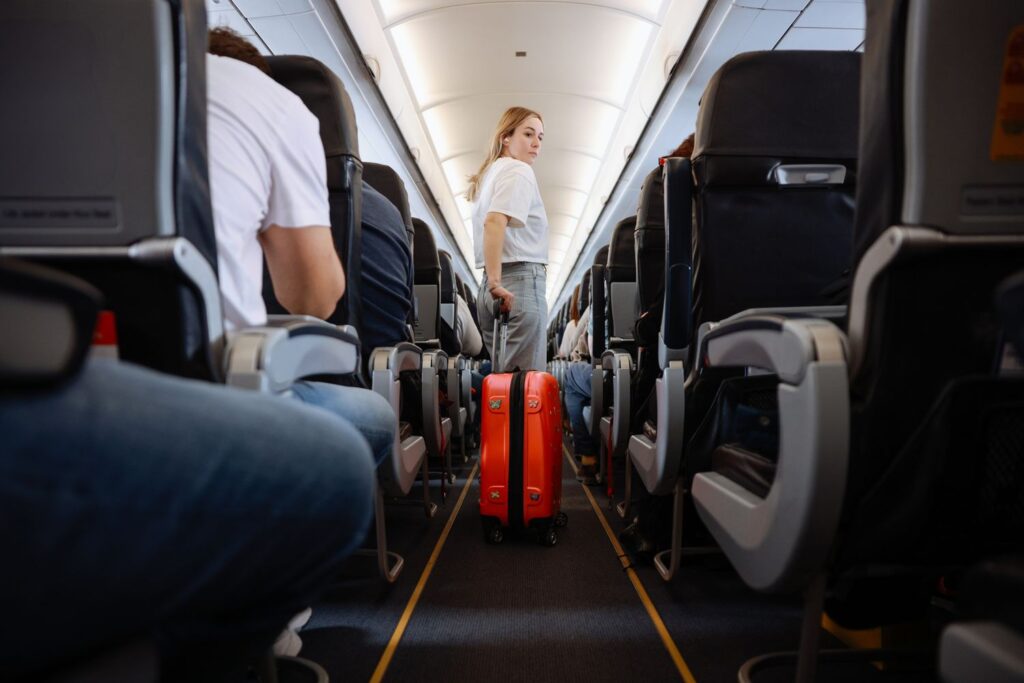- Downgrades are rare but can happen due to seat issues or aircraft changes.
- If you’re downgraded, you’re entitled to a refund of the fare difference and possibly other perks.
- Knowing your rights and acting quickly helps you get better compensation or rebooking options.
One minute you’re dreaming of Champagne and extra legroom; the next, you’re back in coach, wedged into a middle seat and wondering what went wrong. Nothing kills the vacation vibes faster than finding out you’ve been downgraded on your flight. Getting downgraded is never fun, but it’s also relatively uncommon, says Tiffany Funk, co-founder of Point.me. Still, in the rare case a downgrade does happen, there’s usually a good reason—and knowing your rights can make all the difference in how you handle it.
Ahead, we break down everything you need to know about getting downgraded, according to experts.
Know Your Rights
While you don’t necessarily need to accept a downgrade, declining one can mean waiting days for another premium seat to become available—and Funk can attest to this firsthand. “I’ve had flights canceled where the next available business-class seat was more than three days later,” she says.
If you do accept a downgrade, compensation should follow. However, in the United States, there are no federal guidelines that dictate how much or when airlines must reimburse passengers, which makes things murky. Still, most will refund the fare difference. Many carriers may also offer bonus miles, travel credits, and/or an upgrade voucher as gestures of goodwill. And while airlines are often proactive about compensation, it never hurts to speak up. “If you paid for a service they aren’t delivering, you deserve a refund,” says Quinn English of Frequinnt Flyer.
All in all, the exact amount owed ultimately “boils down to the airline’s contract of carriage,” (essentially the fine print you agree to when purchasing your ticket), explains English. That said, “Regardless of where you are and what airline you fly, you are always entitled to the fare difference between the cabin you booked and the cabin you fly.” English is also quick to note that downgraded passengers are not entitled to full refunds. “The airline just has to get you from point A to point B. If they do that, they’ve held up their end of the agreement.”
Europe takes a firmer stance on passenger rights. According to English, under EU Regulation 261, passengers involuntarily downgraded on flights departing from the EU (or on flights to the EU operated by an EU-based carrier) are entitled to a refund of 30 to 75 percent of the ticket price, depending on the flight distance.
Hinterhaus Productions/Getty Images
What to Do If It Happens
If you’ve been downgraded, it’s best to act fast. Passengers notified before departure should contact the airline immediately to ask about alternative flights with available premium seats. If it happens at the gate, speak with an agent or crew member before boarding: It’s often easier to negotiate compensation or rebooking in person versus over the phone or via email.
However, if you’re unable to resolve the issue in person, contact the airline as soon as possible. Be sure to also provide them with your confirmation number, flight details, seat number, and any supporting documentation. The more information you have, the better: These seemingly small details can help corroborate your claim, especially if you’re having trouble obtaining a refund.
How to Avoid Getting Downgraded
While downgrades are almost entirely out of your control, there are a few factors that can work in your favor. Having elite status, booking a higher fare class, and checking in early can all help you hang on to that coveted premium seat. That said, English tells T+L that he “wouldn’t go out of my way to pay for a higher fare class or chase elite status just to decrease my risk of an involuntary downgrade, since the odds of it happening are so low.”
Traveling with a companion also helps. According to English, solo travelers are more likely to be downgraded, just as they are more likely to be bumped. “That is simply because the likelihood of more than one person getting downgraded is obviously lower than just one.”
Still, factors like aircraft swaps or seat malfunctions are beyond your—or anyone’s—control, so the best strategy is to know your rights and remain calm. “As with anything that goes wrong while flying,” says English, “I always urge people to be their own advocate.”


